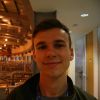
Joe Thompson
- Course: Chemistry with a Year in Industry MChem, BSc
- Year of graduation: 2019
- Job title: Placement Research Student
- Company: Diamond Light Source
Joe completed his Chemistry with a Year in Industry MChem, BSc degree in 2019, graduating with First class honours. During his studies, he undertook a 12-month placement year at Diamond Light Source, the UK’s national synchrotron science facility.
He wanted to undertake a year in industry as he believed it will be beneficial to his studies. He said, “One of the most important parts of Chemistry is working in groups. I knew that working at Diamond Light Source would give me a great insight into a real research team, giving me vital experience collaborating and sharing ideas with others in my field.
I also really wanted to learn lots about surface science, but also to improve my ability to learn new ideas with better efficiency. Since the research I’m undertaking is all new, applying myself to understand concepts that I would’ve never come across would be a very unique and valuable experience, which would help to improve my overall ability to apply myself to new ideas, and to understand them.”
I knew that working at Diamond Light Source would give me a great insight into a real research team, giving me vital experience collaborating and sharing ideas with others in my field.
Year in Industry at Diamond Light Source
Joe spent a year working for Diamond Light Source, a synchrotron source and research facility. His role in the company is to help undertake research on a project looking at a relatively new brand of molecules.
Joe said, “These molecules are surfactants, which have great properties for use in detergents, cosmetics and food products, as they help to reduce the tension between liquids (usually oil and water). They are derived from natural products of the brewing process, meaning they are much more biocompatible and most importantly not derived via chemicals from the petrochemical industry, which cause much more environmental damage when produced.
My project is to therefore characterise these various molecules, to see if their properties lead them to be viable for use in industry, and to study their intermolecular interactions with each other and other types of surfactants, along with many side projects which we will decide on conducting as the research progresses.
The synchrotron here at Diamond can be utilised to examine the microscopic processes that occur at the very small scale in systems involving these surfactants; it’s an indispensable tool: not just for soft matter research but studying a wide variety of systems.”
A typical day at work
“As my job is purely research based, there is no typical day for me! You’ll normally find me in the laboratories preparing samples or making solutions, or discussing with my colleagues about future experiments on the beamline, which require careful planning as to not to waste resources and energy when the time comes.
I also spend a lot of time analysing data, from my own experiments in the chemistry lab, or X-Ray data from the synchrotron, which takes much longer to obtain useful data from. I also regularly compile my findings to show my supervisor, which we then talk about and discuss as where to go from there.”
You’ll normally find me in the laboratories preparing samples or making solutions, or discussing with my colleagues about future experiments on the beamline...
Research projects
The part about his placement that Joe enjoys the most is the independence, as it allows him to decide on what he wants to work on. This gives him a lot of freedom to explore the many areas of interest as he sees fit.
He added, “As my project involves molecules that we know little about, there are many routes that I can potentially go down; being able to consider all of these options gives me a great deal of responsibility, but also allows me to become an important part of a interdisciplinary research team as my results are valuable to everyone involved!
An interesting part of my research has been looking at how X-Rays cause radiation damage to the surfactant molecules, the mechanism that this occurs by, and how we can mitigate this damage by introducing additives, such as antioxidants.”
Gain real-world experience
My ability to communicate information efficiently has considerably improved...
“I think I’ve greatly increased all of the important skills that apply to working in a job in the sciences. My ability to communicate information efficiently has considerably improved, due to regularly talking with colleagues, or conducting presentations on my research. Getting taught how to use various specialist equipment has also been exceptionally useful, since I can use my newly gained knowledge to work on other projects using the same or similar equipment in the future, even if they aren’t on fields that are directly related to the one I’m working on. Getting used to being in a working environment has been great as well, improving my organisational skills, punctuality and team working ability, all of which are applicable to jobs in the STEM field and beyond.”
Advice and tips
...always be confident, and to show that you’re interested in whatever you’re applying for...
“My advice to upcoming students is to always be confident, and to show that you’re interested in whatever you’re applying for by asking lots of questions when you’re interviewed. Also, start looking applying early so that you’ll have more time to prepare for any interviews you might attend. Finally, apply to a variety of companies within your field, even ones that’re in areas you think you might not like: during the placement you may find interests whilst working, whilst also being exposed to many modern fields which are completely new, or with crossovers into yours! It’s amazing how much insight you gain when you start your placement.”
Find out more
Discover more about our Undergraduate degree courses in the School of Chemistry.

